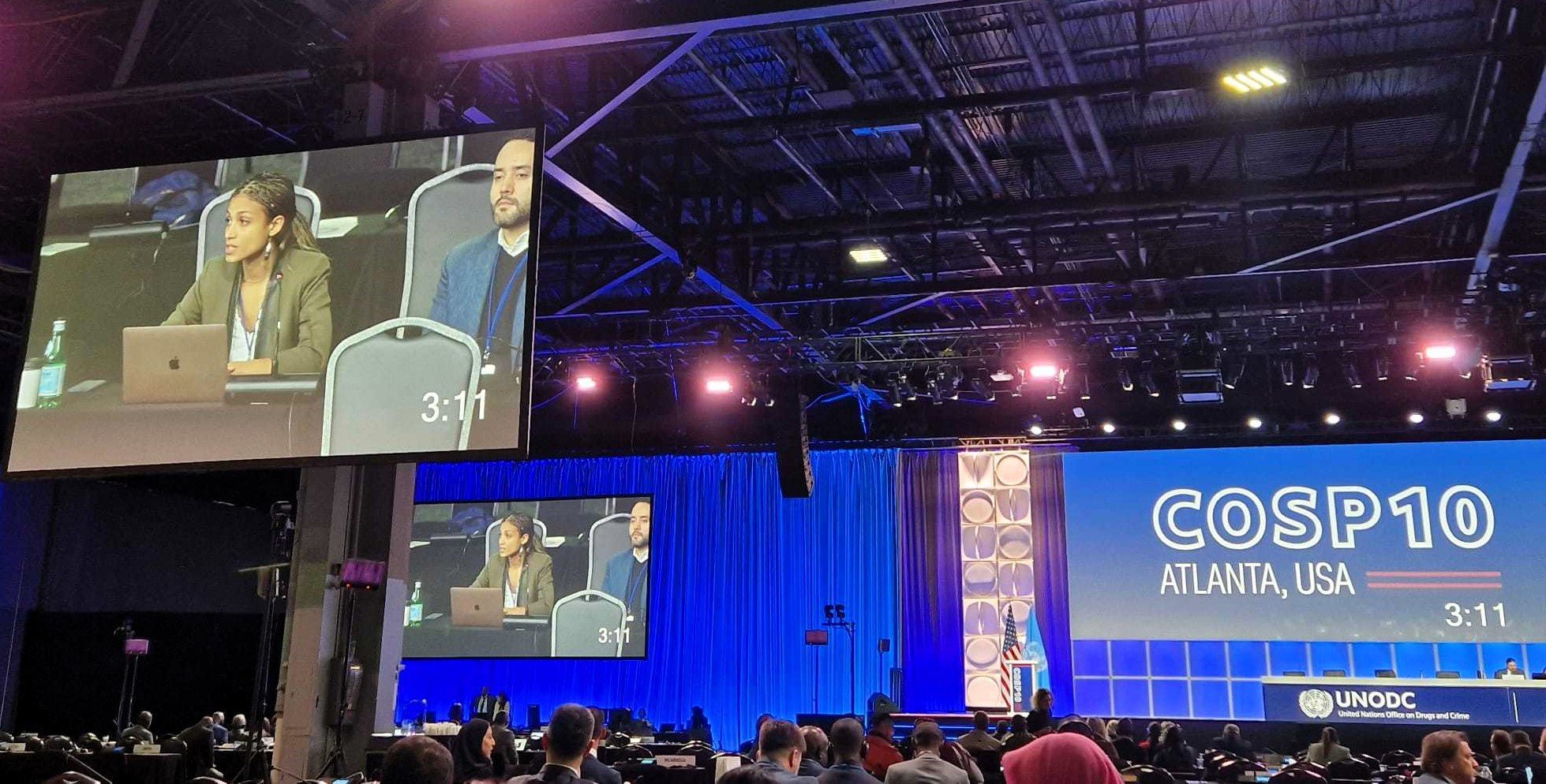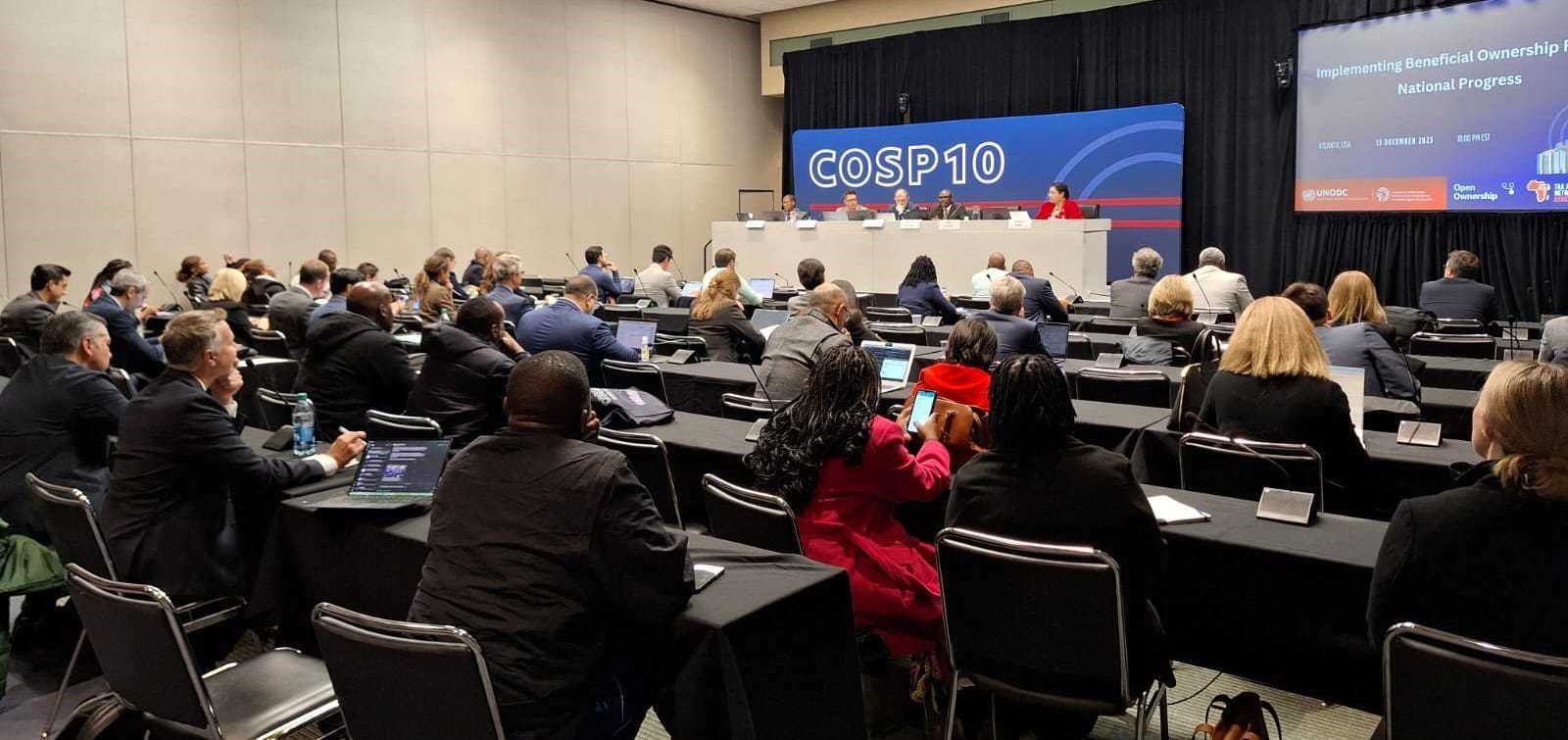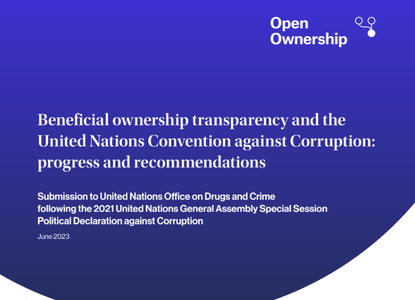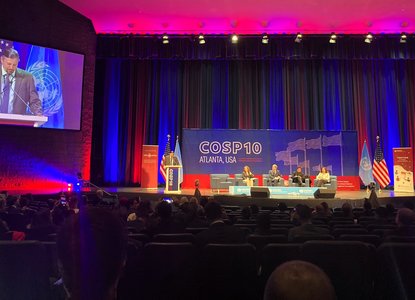Beneficial ownership transparency remains high on the agenda at the 10th Conference of States Parties to the UN Convention against Corruption

Open Ownership’s oral statement at the plenary session of the 10th Conference of the States Parties, delivered by Julie Rialet, Open Ownership’s Policy and Research Associate.
Introduction
Open Ownership welcomes the new resolution, “Enhancing the use of beneficial ownership information to strengthen asset recovery”, adopted on 15 December 2023 in Atlanta, Georgia, at the 10th Conference of the States Parties (CoSP10) to the United Nations Convention against Corruption (UNCAC).
With 190 States parties and 140 signatories, the UNCAC is the only legally binding universal anti-corruption instrument in the world. Every two years, CoSP brings together States parties and signatories to the UNCAC to review and advance the implementation of the Convention. As the main policy-making body of the UNCAC, CoSP adopts resolutions and decisions, which, although non-binding, provide important standards and specific guidance to advance the implementation of the UNCAC.
Building on resolution 9/7, adopted in 2021, the new resolution includes additional provisions that reflect some key users’ needs, such as pushing for effective access to beneficial ownership (BO) data that contains historical records and is up to date and searchable. However, stronger commitments that build on the latest evidence and technological tools are needed to maximise the full potential of beneficial ownership transparency (BOT) as an anti-corruption tool. We comment about this in our next blog post, which you can read on our website now.
Open Ownership is encouraged by a provision that provides a unique opportunity for States parties to create concrete initiatives that accelerate global progress with BOT to prevent and detect corruption. The resolution mandates a review of best practices and challenges on BOI to the 2024-25 work plan of the Intergovernmental Working Group on Prevention, and requests that the United Nations Office on Drugs and Crime (UNODC) convenes an intergovernmental meeting with relevant experts.
What we did and how we did it
CoSP10 – the first civil society forum
Whilst the inclusion of civil society has been a notable gap in the history of UNCAC processes, the 10th session demonstrated strong progress in this regard. We were pleased to contribute to the first-ever Civil Society Forum organised by the United States government at CoSP10 to discuss the development of the new resolution on BOT, and to participate in several other events at CoSP10. Together with fellow members of civil society groups which form the UNCAC Coalition, we signed the joint civil society declaration on 15 December 2023 to acknowledge this development. The new civil society space created valuable opportunities for Open Ownership to share its expertise and lessons learned, including with States parties – support that was acknowledged in the Government of Nigeria’s plenary statement on the adoption of the new resolution.
The leadership of the Government of Nigeria in once again tabling a resolution on BOT and asset recovery was critical, and in our oral statement we highlighted the importance of CoSP10 resolving on stronger provisions than previously existed to fight corruption and illicit financial flows.
As a global leader on BOT, Open Ownership was invited to coordinate a civil society dialogue with the Government of Nigeria, a leading BOT implementer. During the event, representatives from the Government of Nigeria provided deeper insights into the new resolution, and Transparency International shared expertise from civil society actors from across the world.
As outlined by the Government of Nigeria representative during this civil society event, the first drafts of the updated BOT resolution had included many innovative elements that built on global learning. These included provisions for efficient access to structured and interoperable BOI by all relevant authorities, including foreign authorities, civil society, and the media. In support of this, Open Ownership had called upon States parties to coordinate international efforts to advance the use of digital and innovative technologies to facilitate the exchange of beneficial ownership information (BOI) transnationally.
During the resolution negotiations, Open Ownership compiled evidence and examples from national reforms, and provided States parties with a thorough analysis of gaps in global BOT implementation against previous UN resolutions. The Government of Nigeria publicly acknowledged Open Ownership’s collaboration with anti-corruption experts to efficiently deliver this information to States parties during negotiations.
Representatives of States parties also joined a second set of BOT events organised by UNODC, Transparency International, Tax Justice Network Africa, Open Ownership, and the Government of Nigeria later in the week.

Open Ownership’s special event at CoSP10 focused on national progress in implementing BOT.
The discussions
CoSP10 provided a great platform for Open Ownership to contribute its expertise and collaborate with partners, including members of the UNCAC Coalition, to support the UNCAC processes to advance BOT. Having supported 40 countries to develop BOT frameworks and implement or improve their BO registers, Open Ownership is an expert in the development of effective BOT reforms to advance different policy goals, including those focused on tackling corruption.
Expert voices were strong to emphasise that, time and again, illicit financial flows and stolen assets – the proceeds of corruption and other crimes – are hidden and moved around the world using anonymously owned corporate vehicles. Similarly, it was also made clear that BOT is a crucial tool to help address this, as it brings to light who owns, controls, or benefits from companies (beneficial owners).
Looking to CoSP11: What comes next?
The world is set to generate more BO data than ever before – over 60 countries have live BO registers and at least 20 more countries are working toward a launch. The next CoSP will be hosted in December 2025 by Qatar, which has not made any commitments relating to BOT to date.
From Open Ownership’s experience as a global leader in developing and operationalising interoperable BO data, it has become clear that interoperable data should be a pillar of effective international anti-corruption efforts. We have been at the forefront of technical and policy developments to create standardised, structured, and interoperable data, In this context, Open Ownership encourages UNODC and States parties to build on existing policy and technology solutions, including the Open Ownership Principles and the Beneficial Ownership Data Standard (BODS), in order to facilitate international exchanges of data.
BODS is the leading global open standard for BO data, and provides a suite of technology solutions for sharing BO data so that it is interoperable with other datasets. When highlighted in an international forum and instruments like the CoSP and UNCAC resolutions, these existing tools become more visible and accessible to national governments which are looking to develop and implement BOT reforms.
Open Ownership welcomes those interested in discussing further advancements in BOT policy to contact Julie Rialet at [email protected].
Related articles and publications
Publication type
Blog post
Country focus
United States of America
Topics
United Nations Convention against Corruption (UNCAC)
Sections
Implementation

